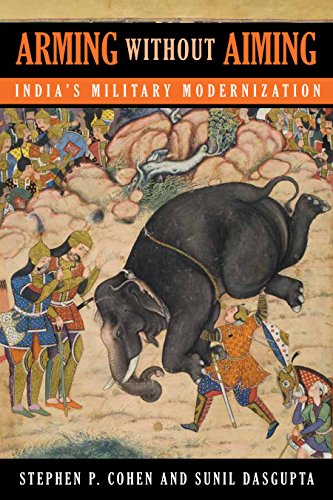Items related to Arming without Aiming: India's Military Modernization

Synopsis
India's growing affluence has led experts to predict a major rearmament effort. The second-most populous nation in the world is beginning to wield the economic power expected of such a behemoth. Its border with Pakistan is a tinderbox, the subcontinent remains vulnerable to religious extremism, and a military rivalry between India and China could erupt in the future. India has long had the motivation for modernizing its military—it now has the resources as well. What should we expect to see in the future, and what will be the likely ramifications? In Arming without Aiming, Stephen Cohen and Sunil Dasgupta answer those crucial questions.
India's armed forces want new weapons worth more than $100 billion. But most of these weapons must come from foreign suppliers due to the failures of India's indigenous research and development. Weapons suppliers from other nations are queuing up in New Delhi. A long relationship between India and Russian manufacturers goes back to the cold war. More recently, India and Israel have developed strong military trade ties. Now, a new military relationship with the United States has generated the greatest hope for military transformation in India.
Against this backdrop of new affluence and newfound access to foreign military technology, Cohen and Dasgupta investigate India's military modernization to find haphazard military change that lacks political direction, suffers from balkanization of military organization and doctrine, remains limited by narrow prospective planning, and is driven by the pursuit of technology free from military-strategic objectives. The character of military change in India, especially the dysfunction in the political-military establishment with regard to procurement, is ultimately the result of a historical doctrine of strategic restraint in place since Nehru. In that context, its approach of arming without strategic purpose remains viable as India seeks great-power accommodation of its rise and does not want to look threatening. The danger lies in its modernization efforts precipitating a period of strategic assertion or contributing to misperception of India's intentions by Pakistan and China, its two most immediate rivals.
"synopsis" may belong to another edition of this title.
About the Author
Stephen P. Cohen is a senior fellow in Foreign Policy Studies at the Brookings Institution. His is the author of numerous books, including The Idea of Pakistan and India: Emerging Power (both with Brookings).
Sunil Dasgupta is director of the University of Maryland-Baltimore County's Political Science Program at the Universities at Shady Grove, and he is also a nonresident fellow in Foreign Policy Studies at Brookings. He also spent five years as senior correspondent for India Today.
Review
"Much has been made of the emergence of India on the global stage. In Arming without Aiming, Cohen and Dasgupta provide an expert assessment of what India's rise means for its unevenly modernizing military, which is destined to become the third largest in the world. Anyone with an interest in the growing rivalry between India and China, or in the impact that a stronger, although still extraordinarily outdated, Indian military will mean for U.S.-India ties, should read this. This is an important book on an important subject, which is likely to remain unparalleled for many years."—Edward Luce, Washington bureau chief, Financial Times
"India's rise to power will remain incomplete until it acquires, and develops, the capacity to effectively utilize the full panoply of military power. Although India has made impressive strides in this direction in recent years, Stephen Cohen's and Sunil Dasgupta's Arming without Aiming demonstrates how much still needs to be done. This cautionary tale will be required reading for all those concerned about Indian defense policy and military modernization."—Ashley J. Tellis, Senior Associate, Carnegie Endowment for International Peace
"The book is an empathetic, objective, and comprehensive narration and analysis of the evolution of Indian defense policy and management. The Indian strategic establishment is groping to find ways and means of safeguarding its progress toward becoming a twenty-first-century knowledge power in an international community still dominated by strategic thought from the World War II era. Steve Cohen and Sunil Dasgupta have brought into bold relief this somewhat inchoate and as yet not fully formulated effort. This will be a required reading for all senior service officers, civil servants, politicians, and academics engaged in Indian security."—K. Subrahmanyam, Indian defense expert
"About this title" may belong to another edition of this title.
- PublisherBrookings Institution Press
- Publication date2010
- ISBN 10 081570402X
- ISBN 13 9780815704027
- BindingHardcover
- LanguageEnglish
- Number of pages223
- Rating
Shipping:
US$ 4.20
Within U.S.A.
Search results for Arming without Aiming: India's Military Modernization
Arming without Aiming: India's Military Modernization
Seller: The Maryland Book Bank, Baltimore, MD, U.S.A.
hardcover. Condition: Very Good. Used - Very Good. Seller Inventory # 11-A-4-0127
Quantity: 1 available
Arming without Aiming: India's Military Modernization
Seller: WeBuyBooks, Rossendale, LANCS, United Kingdom
Condition: Good. Most items will be dispatched the same or the next working day. A copy that has been read but remains in clean condition. All of the pages are intact and the cover is intact and the spine may show signs of wear. The book may have minor markings which are not specifically mentioned. Neat dedication on the opening page. Seller Inventory # wbb0023710759
Quantity: 1 available
Arming Without Aiming: India's Military Modernization
Seller: Buchpark, Trebbin, Germany
Condition: Sehr gut. Zustand: Sehr gut - Gepflegter, sauberer Zustand. | Seiten: 223 | Sprache: Englisch | Produktart: Sonstiges. Seller Inventory # 6522345/2
Quantity: 1 available
Arming without Aiming: India*s Military Modernization
Seller: Mispah books, Redhill, SURRE, United Kingdom
Hardcover. Condition: Like New. Like New. book. Seller Inventory # ERICA758081570402X5
Quantity: 1 available

